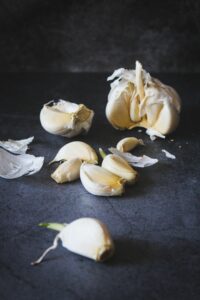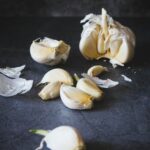Garlic and Covid 19. Garlic is a remedy that many naturopaths have included in their protocols including me. What are the positives and negatives?
In the ever-evolving discourse surrounding natural remedies for COVID-19, garlic has sparked both fascination and scepticism. As a committed naturopath and nutritionist, my goal is to unravel the intricacies of garlic’s influence on COVID-19 and address the controversies surrounding its potential impact on well-being. This blog focuses on debunking four prevalent myths, offering clarity on garlic’s role during these unprecedented times.
committed naturopath and nutritionist, my goal is to unravel the intricacies of garlic’s influence on COVID-19 and address the controversies surrounding its potential impact on well-being. This blog focuses on debunking four prevalent myths, offering clarity on garlic’s role during these unprecedented times.
1. Myth: Garlic Alone Can Cure COVID-19
This prevailing myth suggesting that garlic alone possesses the ability to cure or prevent COVID-19 highlights the need for a comprehensive understanding of preventive measures. While garlic indeed boasts immune-boosting properties, it is imperative to dispel the notion that it serves as a standalone solution against the virus. The reality is that combating COVID-19 requires a multifaceted and layered approach. Relying solely on garlic neglects the importance of proven, evidence-based interventions.
Adhering to public health guidelines fortifies the collective effort to curb the spread of the virus. Practices such as wearing masks, practising social distancing and maintaining hand hygiene serve as crucial components in reducing the risk of transmission of any virus not just Covid.
A well-balanced lifestyle, encompassing a nutritious diet, regular exercise, and adequate sleep, contributes significantly to overall health and immune function. While garlic can be a valuable addition to a health-conscious diet, it is essential to view it as part of a holistic wellness strategy rather than a panacea.
In essence, debunking the myth that garlic alone can suffice in preventing or curing COVID-19 underscores the importance of a comprehensive approach. It urges individuals to adopt evidence-based practices, making informed choices that prioritise community well-being and personal health. By embracing a multifaceted strategy that includes vaccination, adherence to public health guidelines, and a holistic lifestyle, individuals can actively contribute to the collective effort in navigating these challenging times.
2. Myth: Garlic Replaces Evidence-Based Measures
The misconception that incorporating garlic into one’s routine can replace evidence-based measures reveals a crucial misunderstanding of the role of natural remedies in the context of COVID-19. This myth implies that garlic alone possesses the capacity to substitute established and scientifically proven preventive measures. It is vital to dispel this notion and provide clarity on the complementary nature of garlic within a holistic wellness strategy.
The truth is that garlic should be viewed as a complementary component rather than a standalone substitute for evidence-based measures. While garlic does exhibit immune-boosting properties and nutritional benefits, it cannot replace the need for essential hygiene practices.
Integrating garlic into a broader strategy, such as a well-balanced diet and lifestyle, can enhance overall well-being. Garlic’s potential to support immune function and contribute to respiratory health makes it a valuable addition to a health-conscious routine.
In essence, the debunking of the myth that garlic replaces evidence-based measures underscores the importance of adopting a comprehensive and nuanced approach to well-being. It encourages individuals to leverage the benefits of garlic within the framework of established preventive measures, recognizing that a holistic strategy incorporates both natural remedies and scientifically proven interventions. By embracing this balanced perspective, individuals can navigate the complexities of preventive health during the ongoing pandemic with informed choices that prioritise both traditional wisdom and contemporary scientific understanding.
3. Myth: One-Size-Fits-All Garlic Approach
The persistent myth surrounding a one-size-fits-all garlic approach reveals a common misconception in the realm of natural remedies for COVID-19. Contrary to this belief, assuming that everyone will respond uniformly to garlic oversimplifies the complex interplay between individual health profiles and the diverse nature of immune responses.
It is crucial to dispel the notion that a standardised garlic regimen will yield identical results for everyone. Individual responses to garlic can vary significantly. While some individuals may experience immune-boosting benefits from regular garlic consumption, others might not respond as effectively, or in some cases, could even experience adverse reactions.
Understanding the intricate dynamics of these varied responses emphasizes the importance of personalized approaches when considering the incorporation of garlic into one’s wellness routine. Taking into account individual health profiles, including pre-existing conditions, allergies, and potential interactions with medications, becomes paramount in navigating the diverse outcomes associated with garlic consumption.
A holistic and individualized perspective recognizes that the efficacy of garlic as a natural remedy is influenced by factors such as age, overall health, genetic predispositions, and existing medical conditions. Tailoring garlic intake based on these considerations ensures that individuals can harness the potential benefits while minimizing potential risks.
By acknowledging the diversity in responses to garlic, individuals can make informed decisions that align with their unique health circumstances. Consulting with Leah a naturopath and Nutritionist becomes crucial in developing a personalised and effective strategy for integrating garlic into one’s wellness routine. This nuanced approach not only respects the individuality of health profiles but also underscores the importance of evidence-based practices and informed decision-making in the pursuit of holistic well-being during the ongoing pandemic.
4. Myth: Garlic Adverse Effects Are Insignificant
The pervasive myth asserting that garlic’s adverse effects are insignificant necessitates a closer examination of the potential drawbacks associated with its consumption. While garlic is indeed generally regarded as safe for most individuals, dismissing the likelihood of adverse effects overlooks the nuanced nature of how this powerful herb interacts with diverse health profiles.
Contrary to the belief that garlic is universally benign, it is crucial to recognize that some individuals may experience adverse reactions. Digestive discomfort, often in the form of heartburn or upset stomach, is a common side effect for some. Additionally, allergic reactions to garlic are possible, ranging from mild skin irritation to more severe allergic responses.
One of the more critical considerations is the potential interaction of garlic with certain medications. Garlic contains compounds that can interfere with blood clotting, potentially affecting individuals taking anticoagulant medications. It is essential to acknowledge these potential side effects and interactions, reinforcing the need for caution and informed decision-making.
In light of these considerations, the myth downplaying the significance of garlic’s adverse effects emphasizes the importance of approaching its integration into one’s routine with prudence. Rather than assuming universal safety, individuals should be aware of their own health conditions, allergies, and medications. This recognition underscores the necessity of consulting healthcare professionals before incorporating garlic into one’s diet or wellness routine.
The call to action is clear – individuals considering the addition of garlic to their health regimen should prioritize their well-being by seeking guidance from healthcare professionals or naturopaths. This proactive approach ensures that potential risks are minimized, and the benefits of garlic can be harnessed safely and effectively. By acknowledging and addressing potential adverse effects, individuals can make informed choices that align with their unique health circumstances, fostering a holistic approach to well-being during these challenging times.
5. Myth: Garlic and Covid doesn’t work.
The myth suggesting that garlic is not effective against COVID-19 needs to be dispelled, as garlic does offer certain benefits that can contribute to overall well-being during the pandemic. While it is important to clarify that garlic is not a cure or sole preventive measure for COVID-19, it does possess properties that can support the immune system and respiratory health.
Garlic contains allicin, a compound known for its antimicrobial and antiviral properties. Allicin has been studied for its potential to enhance the immune system’s response to infections. While research specific to COVID-19 is ongoing, the immune-boosting attributes of allicin may contribute to the body’s ability to defend against respiratory viruses.
Moreover, garlic has anti-inflammatory properties, which can be beneficial in managing symptoms associated with respiratory infections. Inflammation is a key component of the body’s response to infections, and garlic’s natural anti-inflammatory properties may help alleviate discomfort and promote respiratory well-being.
It is important to stress that garlic should be considered as part of a broader approach to health, including vaccination, adherence to public health guidelines, and maintaining a healthy lifestyle. Consulting with healthcare professionals or naturopaths can help individuals incorporate garlic into their wellness routine in a way that aligns with their overall health profile. While garlic alone is not a substitute for evidence-based measures, its inclusion in a holistic strategy can contribute positively to one’s well-being during the ongoing pandemic.
